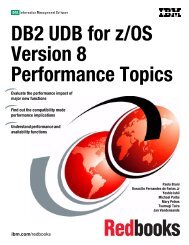IBM AIX Continuous Availability Features - IBM Redbooks
IBM AIX Continuous Availability Features - IBM Redbooks
IBM AIX Continuous Availability Features - IBM Redbooks
Create successful ePaper yourself
Turn your PDF publications into a flip-book with our unique Google optimized e-Paper software.
3. Interval probe manager<br />
The interval probe manager supports probe points that fire at a user-defined time-interval.<br />
The probe points are not located in kernel or application code, but instead are based on<br />
wall clock time interval-based probe events. The interval probe manager accepts a four<br />
tuple probe specification in the following format:<br />
@@interval:*:clock:<br />
The second field is an asterisk (*), indicating that the probe can be fired in any process.<br />
Currently, the interval probe manager does not filter probe events by process IDs. For the<br />
third field, the only value supported is currently the clock keyword that identifies the probe<br />
specification as being for a wall clock probe.<br />
The fourth or last field, that is, the field, identifies the number of<br />
milliseconds between firings of the probe. Currently, the interval probe manager requires<br />
that the value for this field be exactly divisible by 100 and consist only of digits 0 - 9. Thus,<br />
probe events that are apart by 100ms, 200ms, 300ms, and so on, are allowed.<br />
Vue functions<br />
Unlike programs written in C or in FORTRAN programming languages or in a native<br />
language, scripts written in Vue do not have access to the routines provided by the <strong>AIX</strong><br />
system libraries or any user libraries. However, Vue supports its own special library of<br />
functions useful for dynamic tracing programs. Functions include:<br />
Tracing-specific functions<br />
get_function Returns the name of the function that encloses the current probe<br />
timestamp Returns the current time stamp<br />
diff_time Finds the difference between two time stamps<br />
Trace capture functions<br />
printf Formats and prints values of variables and expressions<br />
trace Prints data without formatting<br />
stktrace Formats and prints the stack trace<br />
List functions<br />
list Instantiate a list variable<br />
append Append a new item to list<br />
sum, max, min, avg, count<br />
Aggregation functions that can be applied on a list variable<br />
C-library functions<br />
atoi, strstr Standard string functions<br />
Functions to support tentative tracing<br />
start_tentative, end_tentative<br />
Indicators for start and end of tentative tracing<br />
commit_tentative, discard_tentative<br />
Commit or discard data in tentative buffer<br />
Miscellaneous functions<br />
exit Terminates the tracing program<br />
get_userstring Read string from user memory<br />
118 <strong>IBM</strong> <strong>AIX</strong> <strong>Continuous</strong> <strong>Availability</strong> <strong>Features</strong>

















